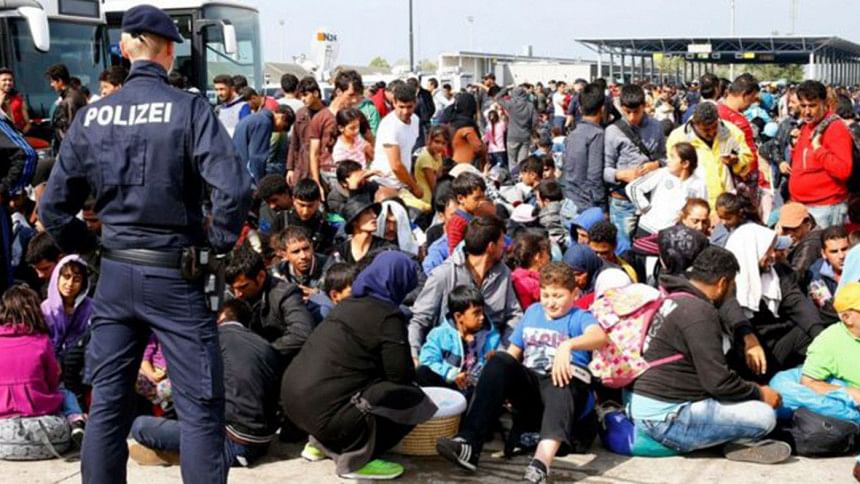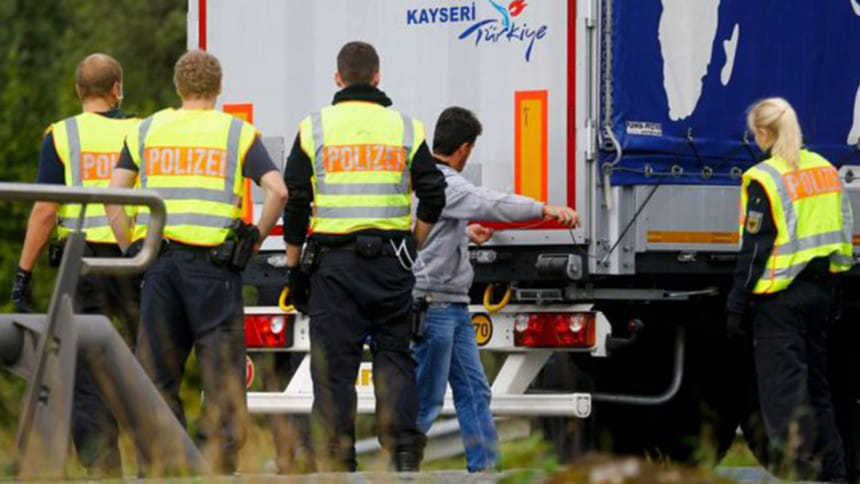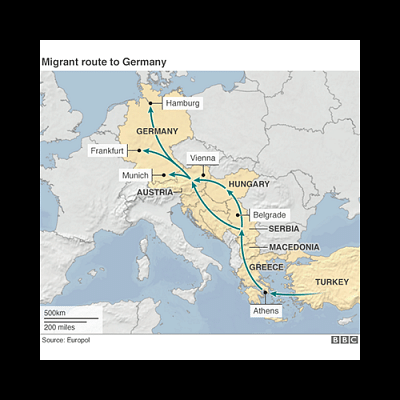Migrant crisis: Austria to deploy troops

Austria says it is deploying troops to help deal with a migrant influx, and will tighten controls on its border with Hungary.
The move came after Germany imposed controls on its border with Austria.
Slovakia and the Netherlands are the latest countries to announce such controls, which challenge the EU's Schengen agreement on free movement.
European interior ministers are beginning emergency talks in Brussels on the migrant crisis.
EU states are struggling to cope with a record influx of non-EU migrants, many aiming for Germany, where the vice-chancellor said one million may arrive this year.
They are due to vote on a plan from May to redistribute an initial 40,000 asylum seekers from Syria and Eritrea through mandatory quotas, though Central and East European states have opposed this.
The EU has since raised the total number of people it seeks to share out through quotas to 160,000 asylum seekers across 23 EU states.
TACKLING PEOPLE SMUGGLERS
On arrival in Brussels, Slovak Interior Minister Robert Kalinak said he was against the quota plan, because "it's not possible to hold the migrants in the countries by force".
Some other ex-communist states in Central and Eastern Europe also oppose mandatory quotas.
Kalinak described Slovakia's new controls as "just a higher presence to find smugglers - it's not classic control".
Schengen: EU free movement deal explained
The Schengen agreement does allow for temporary border controls in emergencies, up to a maximum of two months.
Also on the agenda is a plan to agree a common list of countries considered safe for migrants to be sent back to - a measure that could speed up deportations.
Meanwhile, the EU approved a plan for its operation in the Mediterranean to conduct "boarding, search, seizure and diversion... of vessels suspected of being used for human smuggling or trafficking".
Most of the migrants who surged into Hungary in recent weeks fled conflict, oppression and poverty in Syria, Iraq, Afghanistan and Eritrea.
Many have been refusing to register in countries such as Greece or Hungary, fearing it will stop them being granted asylum in Germany or other EU states.
Hungary is aiming to complete a four-metre-high fence along the border with Serbia by Tuesday, when tougher measures, including arresting illegal immigrants, come into force.
Speaking in Brussels, Sweden's Justice Minister Morgan Johansson said the integration of migrants would be a big challenge for Europe.
He also urged "some order in the situation".
"I don't like when countries are trying to scare people off," he said. "Hungary, for instance, has very vivid rhetoric about 'don't come here'."
Large numbers are pursuing a route from Greece, through Macedonia, Serbia and Hungary, to Austria and Germany.
-- Austrian police said up to 7,000 had arrived from Hungary on Monday, and 14,000 on Sunday
-- Hungary said a record 5,809 migrants had entered the country and been detained on Sunday
Austrian troops are being deployed primarily to provide humanitarian help within Austria, but would be sent to the border if necessary, Chancellor Werner Faymann said.
"If Germany carries out border controls, Austria must put strengthened border controls in place," Vice-Chancellor Reinhold Mitterlehner said. "We are doing that now."

Germany imposed controls on Sunday, with police setting up roadblocks on motorways at the Austrian border.
Local media reported that 25 suspected people traffickers had been arrested overnight, though there was no sign of migrants being turned back.
GERMAN MEDIA REACTION
Some German commentators see the decision to impose controls on the border with Austria as sending a clear signal to the rest of Europe. Others think it is symptomatic of German government indecisiveness.
Die Welt describes it as "perhaps a decision of historic proportions" and a "turning point", saying the move came in response to "impotence within the European Union".
Die Zeit also sees the closure of the border as applying pressure on those European countries "whose response to the refugee crisis has been apathetic".
A headline in Ostsee Zeitung implies that the change of policy was inevitable: "German help is not limitless".
Others question the judgment of Chancellor Angela Merkel. "Was Merkel's generosity a mistake?" asks the Rheinische Post, while Süddeutsche Zeitung's verdict is: "Borders open, borders closed. Nobody dares to predict what will happen... However, many ask whether the chancellor has any plan at all."

German Vice-Chancellor Sigmar Gabriel said border controls were "absolutely not a suspension of the basic rights to asylum", but rather about sending a signal that Germany "cannot accommodate all of the refugees alone".
It can expect to receive one million migrants this year he said, higher than an interior ministry estimate of 800,000.
Germany has repeatedly called on other EU states to take more migrants.
The UK has said it will take 20,000 people from refugee camps in the region over five years. UK Prime Minister David Cameron visited a refugee camp in Lebanon's Bekaa Valley on Monday.

 For all latest news, follow The Daily Star's Google News channel.
For all latest news, follow The Daily Star's Google News channel. 



Comments